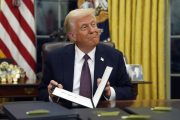
The National Archives announced on November 17 that it was releasing another 10,744 Warren Commission documents that had been previously withheld. The total released so far this year is 34,334 documents. If there is a comprehensive analysis of this voluminous collection of documents it would be a herculean task. But will it shed more light on the Kennedy assassination and subsequent killings, or will it just result in the continuation of confusion regarding the planning and committing of the crimes?
The whole idea of putting Chief Justice Earl Warren in charge of the investigation into Kennedy’s assassination was flawed from the start. Warren was quoted in the New York Times the day after the assassination as having said, “A great and good President has suffered martyrdom as a result of hatred and bitterness that has been injected into the life of our nation by bigots.” Had Warren kept his remarks solely to expressions of grief, he would have been in adherence to the U.S. Constitution. But his remarks regarding his opinion of the cause were unconstitutional for two reasons. First, as a justice of the U.S. Supreme Court, which might have heard any of the murder cases had any rights been infringed in the lower courts, he prejudiced his position by claiming publicly that he knew the cause of a crime. Secondly, he was in Washington, D.C., and the shootings took place in Dallas. He had no direct observation. The only basis he had was hearsay evidence at best.
It’s notable that Robert Welch, founder of The John Birch Society, was quoted in the same New York Times article having said in a message to Mrs. Kennedy: “On behalf of the council of [the] John Birch Society and our members and myself, I wish to express our deep sorrow at so untimely a loss to our nation of its youngest elected President and to convey more particularly to you and to all members of President Kennedy’s family our sincere and heartfelt sympathy in your overwhelming personal loss.” Mr. Welch’s remarks were an example of what Chief Justice Earl Warren should have said, if he had said anything.
Furthermore, the Warren Commission’s genesis was suspect, as noted in the February 1964 Bulletin of the John Birch Society:
The assassination of President Kennedy was on Friday, November 22. On Tuesday, November 26, the Midweek Edition of The Worker, the official publication of the Communist Party, USA, issued an insistent demand — backed up by a long editorial which began on the front page — that President Johnson appoint a special investigating committee, headed by Chief Justice Warren. On Friday, November 29, through executive order 11130, President Johnson complied with this Communist demand by appointing such a committee and naming Earl Warren as its chairman.
The Warren Commission violated the constitutional separation of powers in two ways. First, the investigation of a crime should be accomplished by law enforcement, which is part of the executive branch of government, not the judicial branch. Second, it was a federal intervention into a state matter since murder is constitutionally under state jurisdiction. There were at least three related killings to be investigated: The assassination of the president, the killing of Dallas Police Officer J.D. Tippet, and the shooting of Lee Harvey Oswald. Some suggest there were other suspicious deaths as well. The investigations of these crimes should have been conducted by detectives, not politicians.
As an aside, it should be noted how well the Dallas Police Department gathered evidence and reacted to the assassination. Officers of the Dallas Police Department had arrested Oswald about an hour and 20 minutes after the assassination, and did so while obeying the U.S. Constitution as well as the Constitution of the State of Texas.
It would have been constitutional for agencies of the federal government to assist the Texas Attorney General, the Texas Rangers, and the Dallas Police Department. Certainly federal agencies had evidence, whether it be evidence of guilt or evidence of innocence, because the number one suspect in the assassination, Lee Harvey Oswald, had defected to the Soviet Union, had lived in the Soviet Union, was married to a foreign national, and had crossed a number of state lines during the months prior to the assassination. Oswald visited Mexico in September of 1963 where he reportedly applied for a transit visa to Cuba. Clearly, the U.S. Departments of Defense, Justice, and State could have assisted state and local law enforcement.
The Warren Commission had no constitutional authority to tell state and local law-enforcement agencies to cease investigating these killings. Robert Welch noted in the John Birch Society Bulletin for January of 1964: “His threat to resign as chairman of that Commission, unless the Attorney General of Texas ceased all investigation of two murders committed within the state of Texas, undoubtedly is extremely pleasing to the Communists, under the present circumstances. But it ought to frighten half to death any patriotic American who wants to save our whole Republic from becoming just one more administrative province in a world-wide Communist empire.”
The Warren Commission was touted as being bipartisan in the establishment news media because the commission included a number of Republicans. As previously stated in this article, murder investigations are better accomplished by detectives than politicians. Also, noticeably absent from appointments to the Warren Commission were likes of such genuinely conservative Republicans as Senator John Tower (R-Texas). Senator Tower took umbrage with the image being portrayed by some in the news media that the assassination was a psychological product of politically conservative thinking. Tower disagreed strongly and was quoted in the Dallas Morning News of December 1, 1963: “‘They have said and are still saying, that there is something wrong in our society that breeds men like Lee Harvey Oswald. These people overlook the simple fact, or they refuse to admit it, that Oswald was not fashioned by our society,’ Tower said in his weekly radio broadcast to Texas stations.”
Tower said Oswald’s mind had been fashioned by the propaganda of communism and he had renounced his American citizenship to express loyalty to the Soviet Union. The senator said he had refused to help Oswald when the latter wrote him from the Soviet Union, seeking assistance in returning to the United States. Thankfully, Senator Tower didn’t take the bait. One can only imagine how the liberal news media would have spun this as a half-truth proof that the Kennedy assassination was a right-wing plot had Senator Tower unknowingly helped Lee Harvey Oswald in any way.
Further evidence that the Kennedy assassination was not a right-wing plot can be found by listening to the recording of Lee Harvey Oswald on WDSU Radio in New Orleans on August 21, 1963. The radio show was recorded and sold on 33 1/3 RPM records and entitled Oswald Self-Portrait in Red. It starts with Lee Harvey Oswald proclaiming “Yes. I am a Marxist.” In the ensuing interview, Oswald went on to explain how he was trying to start a chapter of The Fair Play for Cuba Committee in New Orleans. But even more telling is the critique afterward by Edward Butler of INCA (Information Council of the Americas) as he analyzed Oswald’s statements pointing out a heavy influence of Marxist ideology and considerable debating skills.
The 34,334 documents thus far released may seem spicy as news material because they are flavored with the distinction of having been previously classified material. But now that they have been declassified and released to the public, it remains to be seen whether they are meaningful documents or are just a product of political posturing by some Washington, D.C., insiders. It may well be that the real evidence has been hidden in plain sight all along, as pointed out by Robert Welch in the aforementioned John Birch Society Bulletins for January and February of 1964.
One way to look the assassination and relating killings is to consider who would have benefitted from the aftermath. For instance, state and local police were pushed aside in favor of a federal commission. The Second Amendment was violated because these killings help lead to the passage of federal gun-control laws. There was a federal law passed making it a federal crime to kill or threaten to kill a president, as well as other presidential cabinet-level people. Republican Senator Barry Goldwater gaining popularity up until November 22, 1963, and there was a real possibility that he would have defeated Kennedy in the 1964 presidential election. But in the ensuing emotionalism following the assassination, Goldwater and many other conservative political candidates, tainted by insinuations that conservative political thinking shaped Lee Harvey Oswald’s mental attitude, lost their elections. Liberal, Marxist policies were advanced, breaking down state power and furthering consolidation of power into federal hands
In other words, following the Kennedy assassination, the liberal agenda was advanced as a result of the emotional reaction of the American public. Frequently, during times of high emotions, the logical side of people’s thinking is overcome and they forget to consider the constitutionality of the government reaction. It was during such a time in 1963 that an unconstitutional commission was formed and it did a poor job of investigating the Kennedy assassination and the subsequent killings. Will the declassification and release of 34,334 additional documents change anything? Don’t hold your breath.


